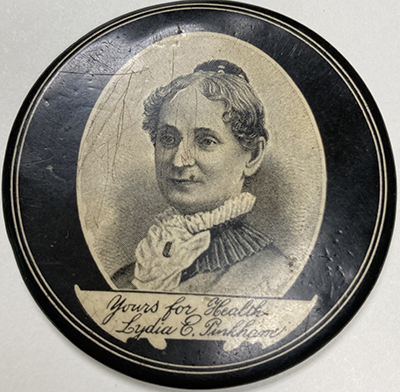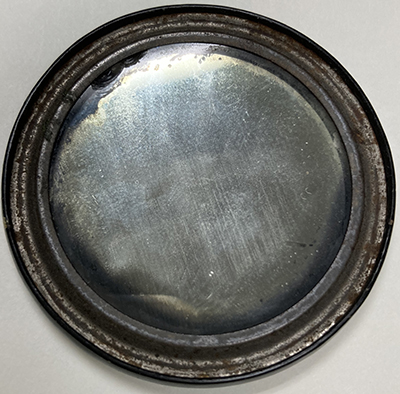

Pocket Mirror Advertising the Lydia E. Pinkham Medicine Company


Who was Lydia E. Pinkham? Lydia Estes Pinkham (1819-1883) of Lynn, Massachusetts, was an entrepreneur best known for her herbal vegetable compound for women that became a well-known patent medicine cure in the late 19th century. Lydia, a homemaker, had for some time been combining various crushed herbs and roots with alcohol and giving it away as a women's home remedy to alleviate various "female complaints." When one of her sons urged her to bottle and sell her compound, the Lydia E. Pinkham Medicine Company was born. Soon her grandmotherly likeness and slogans such as "Only a woman can understand a woman's ills" graced advertising in magazines, newspapers, trade cards, and pamphlets.
In the late nineteenth century when medical practice was still in its infancy, women were especially suspicious of doctor prescribed medicines and dangerous procedures. Homemade remedies created in the home were a common alternative, and patent medicines, such as Pinkham's, marketed toward women garnered wide acceptance with customers even though there was often no scientific basis for their curative claims. By the early 20th century, more stringent federal regulations on the advertising claims of such products and a stipulation that ingredients be listed on packaging dampened the tone of ads and prompted changes in formulas. Nonetheless such medicinal concoctions remained popular well into the 20th century.
The Lydia E. Pinkham Company went on to produce and market many products and published pamphlets providing advice on women's health complaints that touted the company's cures. Customers were prompted to write Lydia for advice on women's health ailments related to menstruation and menopause and ads often included testimonials on the effectiveness of the company's products. The company continued to flourish after her death in 1883, and a version of the vegetable compound produced under the Lydia Pinkham name is still sold today.
Pinkham company advertising also took the form of promotional objects such as this celluloid backed pocket mirror, a popular form of advertising in the early 20th century. Objects such as pocket combs, mirrors, and other small items embellished with advertising were commonly distributed by salesmen to potential customers as free giveaways or accompanying the purchase of a product. Other freebies could be obtained by writing to the company or by filling out a form. Pocket mirrors were produced in various geometric shapes and distributed not only as product or company advertising but also as family portraits, souvenirs commemorating events, and mementos from geographic locations.
This example of an advertising pocket mirror is a 5 cm diameter circular shape featuring a monochrome lithograph image of Lydia E. Pinkham printed on paper that appears textured and fabric-like under a layer of celluloid. The mirror on the reverse has an indentation around the edge indicating it may have also been a lid for a container.
The Lydia E. Pinkham mirror is undated, though probably was produced during the heyday of this form of advertising between 1900 and 1930. Though neither the Pinkham company name nor a product is stated on the mirror's surface, its origin is undeniable due to Pinkham's familiar visage and one of the company's popular slogans, "Yours for Health" accompanied by Lydia's signature. This is a testament to the popularity and ubiquity of the Lydia E. Pinkham name and image. She was undoubtably so easily recognized and associated with the vegetable compound and other Pinkham products that her image and slogan alone resonated with consumers and prompted sales.
This advertising pocket mirror, along with Lydia E. Pinkham Medicine Company pamphlets and publications can be viewed in Special Collections found in McCain Library & Archives at the University of Southern Mississippi. The library is open Monday through Friday from 9am-4pm. The pocket mirror is located at Special Collections call number HD9666.9.P5 A38 1920z.
For additional information on this and other Lydia E. Pinkham items in Special Collections, contact Jennifer Brannock, Curator of Rare Books and Mississippiana, at .
Sources
"Antique and Vintage Advertising Mirrors." Collector's Weekly. https://www.collectorsweekly.com/advertising/mirrors. Accessed 6 August 2024.
Barry, Rebecca Rego. "Was Lydia E. Pinkham the Queen of Quackery?" JSTOR Daily, 22 November 2017, https://daily.jstor.org/was-lydia-e-pinkham-the-queen-of-quackery/.
Accessed 7 August 2024.
Dantzic, Cynthia Maris. Antique Pocket Mirrors: Pictorial and Advertising Miniatures.
Schiffer Pub., 2002.
Horwitz, Rainey. "Lydia Pinkham's Vegetable Compound (1873-1906)." Embryo Project Encyclopedia, Arizona State University, 20 May 2017, https://embryo.asu.edu/pages/lydia-pinkhams-vegetable-compound-1873-1906. Accessed 31 July 2024.
Felder, Deborah G. "Lydia E. Pinkham (1819–1883)." The American Women's Almanac:
500 Years of Making History, 1st edition, Visible Ink Press, 2020. Credo Reference, https://search.credoreference.com/articles/Qm9va0FydGljbGU6NDc2OTI0Mg==?aid=99082. Accessed 30 July 2024.
Washburn, Robert Collyer. The Life and Times of Lydia E. Pinkham. Arno Press, 1976.
Text by Diana Simpson, Catalog Librarian